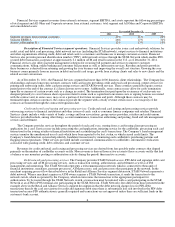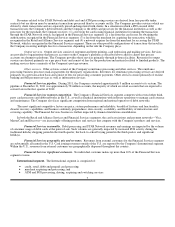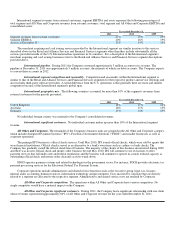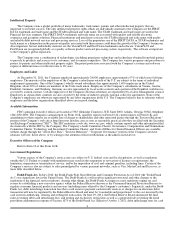First Data 2011 Annual Report Download - page 18
Download and view the complete annual report
Please find page 18 of the 2011 First Data annual report below. You can navigate through the pages in the report by either clicking on the pages listed below, or by using the keyword search tool below to find specific information within the annual report.
Changes in laws, regulations and enforcement activities may adversely affect the products, services and markets in which the
Company operates.
The Company and its customers are subject to regulations that affect the electronic payments industry in the many countries in
which the Company's services are used. In particular, the Company's customers are subject to numerous regulations applicable to
banks, financial institutions and card issuers in the United States and abroad, and, consequently, the Company is at times affected by
these federal, state and local regulations. The U.S. Congress and governmental agencies have increased their scrutiny of a number of
credit card practices, from which some of the Company's customers derive significant revenue. Regulation of the payments industry,
including regulations applicable to the Company and its customers, has increased significantly in recent years. Failure to comply with
regulations may result in the suspension or revocation of licenses or registrations, the limitation, suspension or termination of services,
and/or the imposition of civil and criminal penalties, including fines which could have an adverse effect on the Company's results of
operation and financial condition. The Company is subject to U.S. and international financial services regulations, a myriad of
consumer protection laws, escheat regulations and privacy and information security regulations to name only a few. Changes to legal
rules and regulations, or interpretation or enforcement thereof, could have a negative financial effect on the Company. In particular,
the Dodd-Frank Wall Street Reform and Consumer Protection Act (the "Dodd-Frank Act"), which was signed into law in July 2010,
significantly changes the U.S. financial regulatory system, including creating a new executive agency within the Federal Reserve
Board to regulate consumer financial products and services (including many offered by the Company's customers), restricting debit
card fees paid by merchants to issuer banks and allowing merchants to offer discounts for different payment methods. On June 29,
2011, the Federal Reserve Board announced the final rules governing debit card interchange fees, and routing and exclusivity
restrictions as well as a proposed rule governing the fraud prevention adjustment in response to the Dodd-Frank Act. Within the
Retail and Alliance Services segment the Company experienced some transitory benefit due mostly to lower debit interchange rates,
however, the overall impact of the Dodd-Frank Act on the Company is difficult to estimate because it will take some time for the
market to react and adjust to the new regulations and additional regulations may be developed by the newly created Bureau of
Consumer Financial Protection, with respect to consumer financial products and services that impact the Company or its customers.
The Federal Reserve Board also needs to develop regulations for approval by the Financial Stability Oversight Council with respect to
criteria for, and additional oversight of, certain systemically important financial institutions. At this point it is unclear as to whether
the Company would be subject to additional oversight or what such oversight may entail. Each of the proposed regulations may
adversely affect the Company's business or operations, directly or indirectly (if, for example, the Company's customers' business and
operations are adversely affected). In addition, an inadvertent failure by the Company to comply with laws and regulations, as well as
rapidly evolving social expectations of corporate fairness, could damage the Company's reputation or brands. Furthermore, the
Company is subject to tax laws in each jurisdiction where it does business. Changes in tax laws or their interpretations could decrease
the value of revenues the Company receives, the value of tax loss carryforwards and tax credits recorded on the Company's balance
sheet and the amount of the Company's cash flow and have a material adverse impact on the Company's business.
The Company depends, in part, on its merchant relationships and alliances to grow the Company's Retail and Alliance Services
business. If the Company is unable to maintain these relationships and alliances, the Company's business may be adversely
affected.
Growth in the Company's Retail and Alliance Services business is derived primarily from acquiring new merchant relationships,
new and enhanced product and service offerings, cross selling products and services into existing relationships, the shift of consumer
spending to increased usage of electronic forms of payment and the strength of the Company's alliance partnerships with banks and
financial institutions and other third parties. A substantial portion of the Company's business is conducted through "alliances" with
banks and other institutions. The Company's alliance structures take on different forms, including consolidated subsidiaries, equity
method investments and revenue sharing arrangements. Under the alliance program, the Company and a bank or other institution form
an alliance, either contractually or through a separate legal entity. Merchant contracts may be contributed to the alliance by the
Company and/or the bank or institution. The banks and other institutions generally provide card association sponsorship, clearing and
settlement services. These institutions typically act as a merchant referral source when the institution has an existing banking or other
relationship. The Company provides transaction processing and related functions. Both alliance partners may provide management,
sales, marketing, and other administrative services. The alliance structure allows the Company to be the processor for multiple
financial institutions, any one of which may be selected by the merchant as their bank partner. The Company relies on the continuing
growth of its merchant relationships, alliances and other distribution channels. There can be no guarantee that this growth will
continue. The loss of merchant relationships or alliance and financial institution partners could negatively impact the Company's
business and result in a reduction of the Company's revenue and profit.
The Company relies on various financial institutions to provide clearing services in connection with its settlement activities. If the
Company is unable to maintain clearing services with these financial institutions and is unable to find a replacement, the
Company's business may be adversely affected.
The Company relies on various financial institutions to provide clearing services in connection with the settlement activities of
the Company. If such financial institutions should stop providing clearing services the Company must find other financial institutions
to provide those services. If the Company is unable to find a replacement financial institution the Company may no longer be able to
provide processing services to certain customers which could negatively impact the revenue and earnings of the Company.
16
























